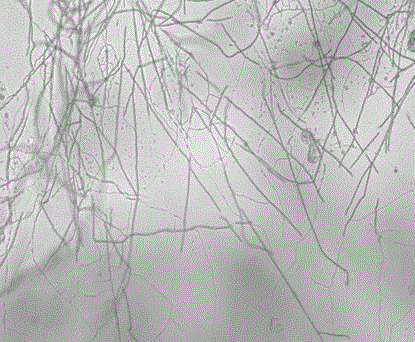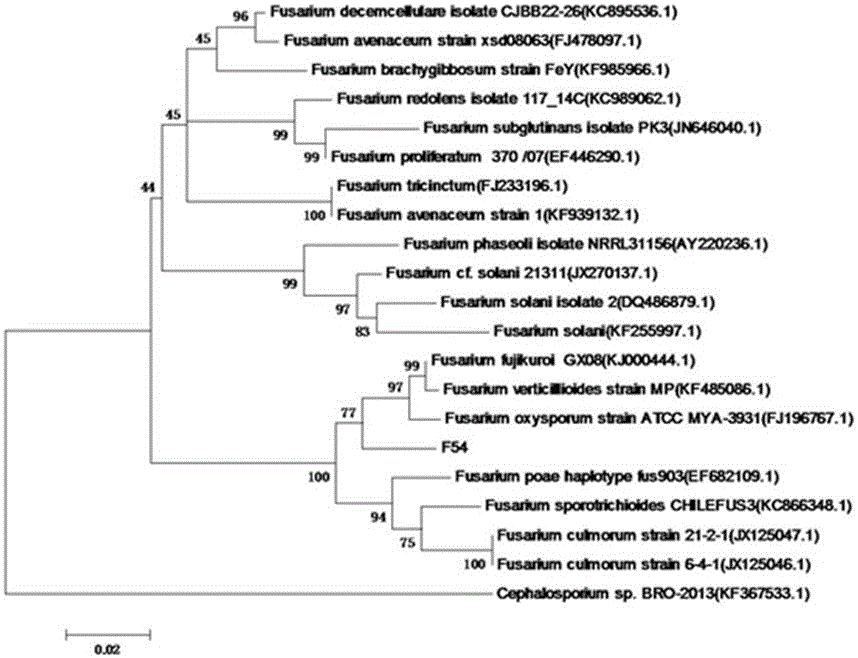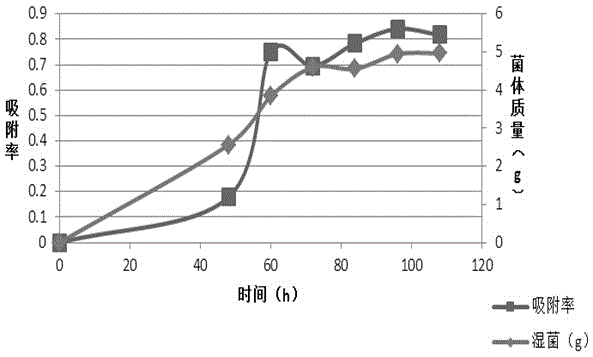A radiation-resistant Fusarium fungus and its application in biological treatment of adsorbed cesium
A biological treatment, Fusarium technology, applied to radiation-resistant Fusarium and its application in radionuclide cesium adsorption, microbial strains are used in the field of bioabsorption of radionuclides, which can solve the limitation of the ability to repair radioactively polluted environments And other issues
- Summary
- Abstract
- Description
- Claims
- Application Information
AI Technical Summary
Problems solved by technology
Method used
Image
Examples
Embodiment 1
[0036] Embodiment one: Fusarium ( Fusarium sp. .) Isolation and cultivation of F54 CGMCC No.8359
[0037] 1. Separation
[0038] Radiation resistant Fusarium used in the present invention ( Fusarium sp. .) The Institute of Microbiology Application of Xinjiang Academy of Agricultural Sciences took samples from radioactively contaminated soil in a certain place in Xinjiang, and used the traditional plate culture method to separate the microorganisms in the soil layer. The culture medium is an enrichment condition, and a batch of well-growing microbial strains are screened out, and a strain numbered F54 is selected out of them.
[0039] Separation steps: According to the gradient dilution method, weigh 10g of soil samples in 90mL sterile physiological saline, and perform gradient dilution after activation at 30°C for 30min. Select 10 -2 、10 -3 、10 -4 The dilutions were spread on the plates of PDA medium respectively, and each treatment was replicated three times, and cultu...
Embodiment 2
[0049] Embodiment two: Fusarium ( Fusarium sp. ) Molecular level identification of F54 CGMCC No.8359
[0050] 1. Extraction of fungal genome:
[0051] Pick fungal hyphae from the culture medium and remove agar as much as possible; add 200ul plant lysis buffer, grind to powder; add 600ul plant lysis buf, 0.8ul β-mercaptoethanol, mix well; 65℃ water bath for 40min, 12000rpm, 10min Centrifuge; remove the supernatant, add an equal volume of chloroform to extract, centrifuge at 12000rpm for 5min; add 700ul plant Bindingbuf, put on the column and let stand for 5min; Leave to evaporate and dry for 10 minutes, add 40ul H2O, let stand for 5-10 minutes; replace with a new tube, centrifuge at 13000rpm for 2 minutes, the genome is at the bottom of the tube.
[0052] 2. ITS sequence amplification and sequencing
[0053] Amplification with fungal ITS universal primers:
[0054] Forward primer ITS1: TCCGTAGGTGAACCTGCGG
[0055] Reverse primer ITS4: TCCTCCGCTTATTGATATGC
[0056] The PC...
Embodiment 3
[0059] Embodiment three: Fusarium ( Fusarium sp. .) Radiation resistance of F54 CGMCC No.8359
[0060] Two conditions must be met for microorganisms to treat radioactive pollution in the environment, that is, they can survive in a radiation environment and have high adsorption selectivity for polluting nuclides. The fungus Fusarium sp. ( Fusarium sp. ) F54 is extracted from radionuclide-contaminated soil. 60 Co radioactive source γ-ray irradiation, the cumulative radiation dose is 10 kGy. Through the comparison of irradiated samples and non-irradiated samples, it was found that its growth was not affected by irradiation, that is, Fusarium sp. F54 had a strong ability to resist radiation.
[0061] Show that Fusarium provided by the invention ( Fusarium sp. ) F54 CGMCC No.8359 was isolated from radioactive soil and accumulated with an irradiation dose of 10 kGy, which has strong radiation resistance.
PUM
 Login to View More
Login to View More Abstract
Description
Claims
Application Information
 Login to View More
Login to View More - R&D
- Intellectual Property
- Life Sciences
- Materials
- Tech Scout
- Unparalleled Data Quality
- Higher Quality Content
- 60% Fewer Hallucinations
Browse by: Latest US Patents, China's latest patents, Technical Efficacy Thesaurus, Application Domain, Technology Topic, Popular Technical Reports.
© 2025 PatSnap. All rights reserved.Legal|Privacy policy|Modern Slavery Act Transparency Statement|Sitemap|About US| Contact US: help@patsnap.com



